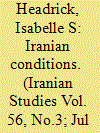| Srl | Item |
| 1 |
ID:
169988


|
|
|
|
|
| Summary/Abstract |
The Alliance Israélite Universelle, an international Jewish educational philanthropy based in Paris, began to establish modern, secularized schools for girls and boys in North Africa, the Middle East, and Eastern Europe in 1862. The first school was established in Iran in 1898. The Alliance saw itself as addressing the big questions of its time that faced Jews: antisemitism, poverty, and perceived backwardness. It sought to promote the integration of Jews as well as to advance the status of girls through educating them and opposing child marriage. This article examines the integration of Iranian Jews and the professionalization of women in Iran in the first half of the twentieth century, using the Alliance’s Jewish female school directors as a case study. It argues that family relationships and networks played a critical role in facilitating both of these modernizing processes.
|
|
|
|
|
|
|
|
|
|
|
|
|
|
|
|
| 2 |
ID:
192995


|
|
|
|
|
| Summary/Abstract |
The staff of the Alliance Israélite Universelle (AIU), an international educational philanthropy, were professionally and personally buffeted by health and medical concerns. This article examines the value of their letters, arguing they serve as a deep reservoir of biased yet valuable evidence that corroborates other sources while also providing insight into the health and disease conditions of Iran's provincial cities. This article also asks why, in the early twentieth century, AIU staff failed to acknowledge Iranians who were similarly invested in medical services and public hygiene. Ultimately, the letters help scholars witness historical evolutions in Iran and in the AIU staff's understandings of the Iranian social and medical landscape they inhabited.
|
|
|
|
|
|
|
|
|
|
|
|
|
|
|
|